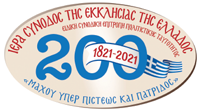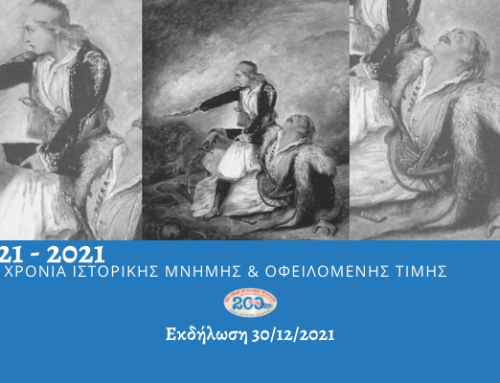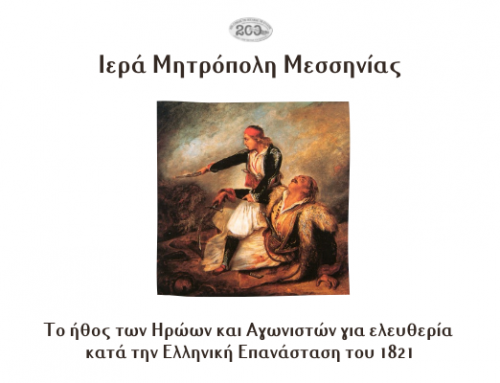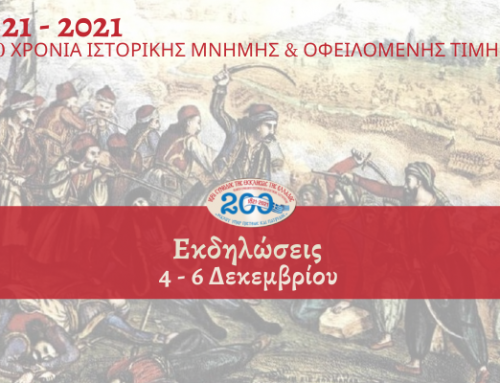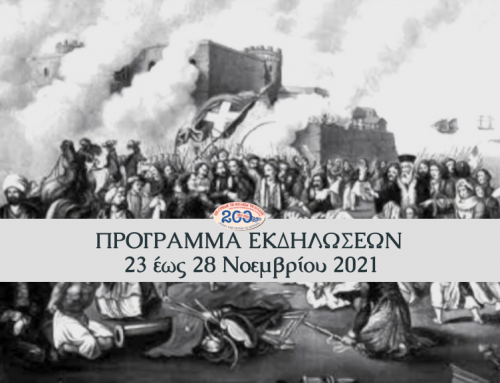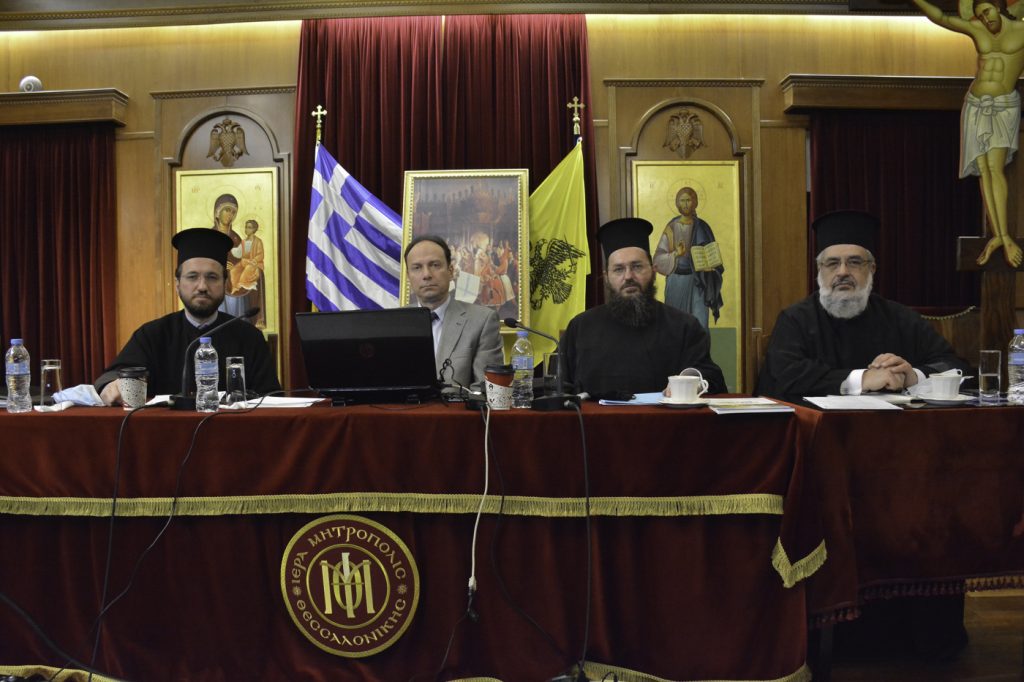
Holy Metropolitanate of Thessaloniki
Scholarly Conference
“Commencement of the Revolution in Moldowallachia
– Ypsilantis and the participation in the Struggle of the Greeks of Pontus (on the grounds of the Pontic origins of Ypsilantis), Asia Minor, and the Diaspora”
Today, Monday, February 22, 2021, the proceedings of the Scholarly Conference carried out online on the topic ““Commencement of the Revolution in Moldowallachia – Ypsilantis and the participation in the Struggle of the Greeks of Pontus (on the grounds of the Pontic origins of Ypsilantis), Asia Minor, and the Diaspora” were completed. The Conference was organized, under the auspices of the Holy Metropolitanate of Thessaloniki, by the Special Synodic Committee of the Holy Synod of the Church of Greece on Cultural Identity within the framework of the Synodic and peripheral events for the 200 years since the Greek Revolution.
The proceedings of the Conference began on Sunday, February 21, 2021, with a Solemn Doxology performed in the Holy Church of the Patron Saint Demetrios by the Very Rev. Archimandrite Father Bartholomaios Antoniou – Triantaphyllides, Secretary of the Special Synodic Committee of the Holy Synod of the Church of Greece on Cultural Identity, with all the healthcare measures for the protection from the spread of the Covid-19 pandemic duly observed.
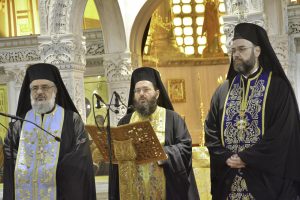
Subsequently, addressing the congregation, the Protosynkellos of the Metropolitanate of Thessaloniki, Very Rev. Archimandrite Father Iakovos Athanassiou, in his capacity as representative of the All-Holy Metropolitan Anthimos of Thessaloniki, stated, inter alia, that “the revolutionary move by Alexandros Ypsilantis in the Transdanubian Principalities is considered the preamble to the armed struggle of the national regeneration. That preamble was seemingly a failure but essentially crucial and emblematic, and its significance transcended and determined the developments which ensued. The sacrificial course of Ypsilantis and his companions inspires and guides the risen nation; his inspired Declaration sets the tone for the entire struggle of our national regeneration. A celebration of the bicentenary cannot remain indifferent to what came to pass at that time in Moldowallachia”.
At the end of his address the Very Rev. Protosynkellos emphasized that “The Metropolitanate of Thessaloniki considers the proposal of the Holy Synod a sacred debt and national duty and gladly shoulders the task of highlighting the specific beginning of the national struggle, thanks to the willing response of the All-Holy Metropolitan Anthimos of Thessaloniki”.
The Conference was continued on Monday, February 22, 2021, and was completed with papers delivered by distinguished scholars, academics and researchers, as follows:
Monday, February 22, 2021
11h – 14h
11h – 11h30
Opening of the Conference – Welcome messages
- Very Rev. Archimandrite Father Bartholomaios Antoniou – Triantaphyllides, Secretary of the Special Synodic Committee of the Holy Synod of the Church of Greece on Cultural Identity;
- The Very Rev. Archimandrite Father Iakovos Athanassiou, Protosynkellos of the Holy Metropolitanate of Thessaloniki, representing the All-Holy Metropolitan Anthimos of Thessaloniki conveyed the warm wishes and blessings of the All-Holy Metropolitan Anthimos of Thessaloniki for the success of the Conference, as well as greeting messages from Mr Stavros Kalafatis, Minister of Macedonia and Thrace; Apostolos Tzitzikostas, Head of the Region of Central Macedonia; and Mr Constantinos Zervas, Mayor of Thessaloniki.
- Very Rev. Archimandrite Father Nikolaos Papagheorghiou, Introductory reading-out of the Declaration of February 24, 1821, of Alexandros Ypsilantis.
11h30 – 12h30 | 1st Session
Chair: Mr Constantinos Kotsiopoulos,
Associate Professor of the Sociology of Christianity, Department of Social Theology and Christian Culture, Faculty of Theology, Aristotle University of Thessaloniki
11h30 – 11h50 | 1st paper: “Education in Moldowallachia”.
Speaker: Ms Sophia Tahou -–Eliadou, Professor of Modern Greek History and History of Education, Department of Pædagogics of Primary Education in Florina, University of Western Macedonia.
11h50 – 12h10 | 2nd paper: “The participation of the Thracians in the Revolution of Moldowallachia”.
Speaker: Ms Iphigheneia Vamvakidou, Professor of Contemporary Greek History and Culture, Department of Pædagogics of Nursery School Teachers, Faculty of Social Sciences and Humanities, University of Western Macedonia.
12h10 – 12h30 | Questions – Discussion.
12h30 – 14h00 | 2nd Session
Chair: Mr Symeon Paschalides,
Professor of Patristics and Hagiology, Department of Social Theology and Christian Culture, Faculty of Theology, Aristotle University of Thessaloniki
12h30 – 12h50 | 1st paper: “The purpose of the commencement of the Revolution in Moldowallachia”.
Speaker: Mr Constantinos Kotsiopoulos, Associate Professor of the Sociology of Christianity, Department of Social Theology and Christian Culture, Faculty of Theology, Aristotle University of Thessaloniki
12h50 – 13h10 | 2nd paper: “The contribution of the Ypsilantis Brothers to the Greek Palingenesia”.
Speaker: Mr Kyriakos Hatzikyriakides, Assistant Professor, Chair of Pontic Studies, Department of History and Archæology, Faculty of Philosophy, Aristotle University of Thessaloniki.
13h10 – 13h30 | 3rd paper: “In Trebizond they became partners in it …”.
Speaker: Mr Theodossios Kyriakides, Ph.D. in History and Scholarly Associate, Chair of Pontic Studies, Faculty of Philosophy, Aristotle University of Athens, and Lecturer in the Faculty of Humanities of the International University of Greece.
13h30 – 14h00 | Questions – Discussion
Once all the papers had been delivered, questions were put by the audience to the speakers of the Conference and led to a fertile and constructive debate. Finally, the Conference was declared closed by the Secretary of the Special Synodic Committee on Cultural Identity, Archimandrite Father Bartholomaios Antoniou-Triantaphyllides, who thanked the All-Holy Metropolitan Anthimos of Thessaloniki for the wholehearted hospitality and excellent organization of the two-day celebratory events as well as all the participants, speakers and other contributors to the Conference who ensured its smooth conduct.
It was made possible to attend the Conference through relevant links of the “zoom” online platform.
